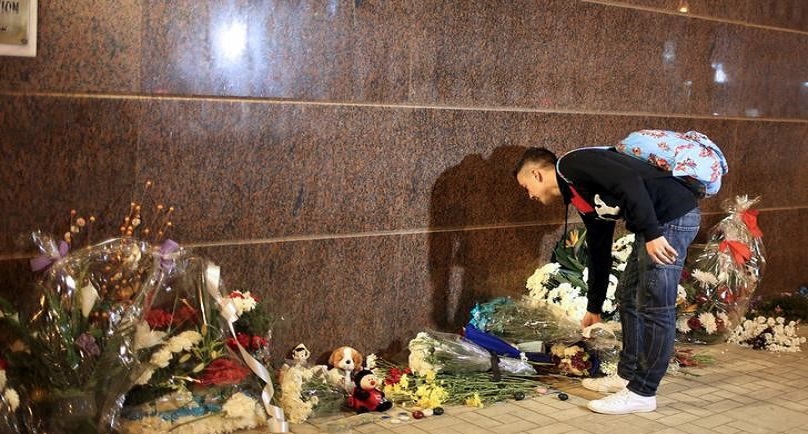Image:A Russian young man lays flowers in front of the Russian embassy in Cairo to commemorate victims of the Russian airplane crash at the Sinai, Egypt, November 1, 2015. REUTERS/Asmaa Waguih
![]()
By Jonathan Landay and Mark Hosenball
WASHINGTON (Reuters) – Russian communications intercepted by U.S. intelligence agencies showed Russia believed the plane that crashed in Sinai, Egypt, on Oct. 31 was brought down by a bomb, U.S. sources familiar with the matter said on Monday.
The intercepts are among pieces of evidence leading U.S. officials to suspect that a device planted on Metrojet Flight 9268 exploded shortly after the Airbus A321 took off from the resort city of Sharm al-Sheikh, the sources said.
All 224 passengers and crew were killed when the plane crashed in the desert on the way to St. Petersburg, Russia.
Egypt and Russia have yet to formally announce the cause of the disaster. Both countries dismissed as premature U.S. and British assessments last week that a bomb likely was responsible. Foreign airlines cancelled a wave of flights to Egypt’s Red Sea resorts following the crash.
After initially signalling normal air traffic would proceed, Russia late last week suspended passenger flights to Egypt. Over the weekend, Russia mounted an airlift to repatriate thousands of Russian vacationers who had been stranded in Sinai after regular flights were cancelled.
Within days of the crash, U.S. and British government sources were suggesting that intercepted communications chatter indicated that the plane had been brought down by a bomb.
The Islamic State’s local affiliate, which calls itself the Sinai Province of Islamic State, claimed responsibility for the crash, and indicated it was in retaliation for Russia’s military intervention in the Syrian civil war.
The group has been fighting the Egyptian army in the Sinai, most of which is a closed military zone, in a conflict that human rights groups say has claimed thousands of civilian lives.
A U.S. government source said on Monday that neither Russia nor Egypt has accepted an offer from the FBI to assist them in investigating the crash.
The FBI has offered “forensic assistance” and other unspecified services to both Russia and Egypt, FBI spokesman Joshua Campbell said.
Speaking to CNN on Monday, British Foreign Secretary Philip Hammond said “it’s more likely than not that it was an explosive device on the aircraft” and “there’s going to be a high probability” that Islamic State was involved.
Only an analysis of the wreckage could determine if a bomb caused the crash, Hammond said. If it was a bomb, the possibilities that it was an attack directed from Islamic State headquarters in Syria or one carried out by someone radicalised by the group’s propaganda should both be investigated, he said.
The possibility that Islamic State operatives were able to infiltrate Sharm al-Sheikh Airport and plant a bomb aboard a commercial aircraft has heightened worries among U.S. officials about the danger posed by the group’s Sinai branch.
“It has elevated concern,” said a U.S. official, who requested anonymity in order to discuss the issue.
The U.S. official said that a leading theory is that an airport worker may have planted the suspected bomb aboard the Russian plane.
U.S. air carriers for years have avoided flying into or out of Sharm al-Sheikh airport because of longstanding worries about security at the facility, U.S. officials said.
Because no U.S. airlines fly there, the officials said, the U.S. Transportation Security Administration has not recently evaluated security at the airport.
(Editing by Kevin Drawbaugh, Howard Goller and Ken Wills)
Copyright 2015 Thomson Reuters. Click for Restrictions.


